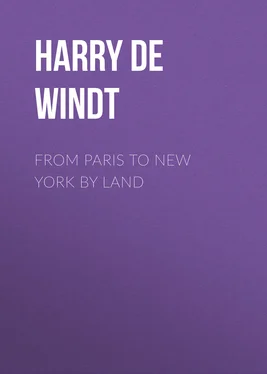Harry De Windt - From Paris to New York by Land
Здесь есть возможность читать онлайн «Harry De Windt - From Paris to New York by Land» — ознакомительный отрывок электронной книги совершенно бесплатно, а после прочтения отрывка купить полную версию. В некоторых случаях можно слушать аудио, скачать через торрент в формате fb2 и присутствует краткое содержание. Жанр: foreign_prose, foreign_antique, на английском языке. Описание произведения, (предисловие) а так же отзывы посетителей доступны на портале библиотеки ЛибКат.
- Название:From Paris to New York by Land
- Автор:
- Жанр:
- Год:неизвестен
- ISBN:нет данных
- Рейтинг книги:4 / 5. Голосов: 1
-
Избранное:Добавить в избранное
- Отзывы:
-
Ваша оценка:
- 80
- 1
- 2
- 3
- 4
- 5
From Paris to New York by Land: краткое содержание, описание и аннотация
Предлагаем к чтению аннотацию, описание, краткое содержание или предисловие (зависит от того, что написал сам автор книги «From Paris to New York by Land»). Если вы не нашли необходимую информацию о книге — напишите в комментариях, мы постараемся отыскать её.
From Paris to New York by Land — читать онлайн ознакомительный отрывок
Ниже представлен текст книги, разбитый по страницам. Система сохранения места последней прочитанной страницы, позволяет с удобством читать онлайн бесплатно книгу «From Paris to New York by Land», без необходимости каждый раз заново искать на чём Вы остановились. Поставьте закладку, и сможете в любой момент перейти на страницу, на которой закончили чтение.
Интервал:
Закладка:
Criminal convicts here are also well cared for, although the prison, which contained about ninety inmates, was old and dilapidated, like almost every other building in the place. But the wards appeared to be fairly clean and well warmed, a comfortable infirmary adjoined the building, and also a home maintained by private subscriptions for the children of prisoners. Enforced idleness seemed to be the chief complaint from which the convicts were suffering, for during the long winter months it is naturally difficult to find them employment.
Being aware that Russian officials are seldom overpaid, the lavish style in which they entertained us astonished me, for provisions of all kinds must, I imagined, always be at famine prices in a town within measurable distance of the Arctic regions. But inquiry proved that I was entirely wrong, and that living here is as cheap, if not cheaper, than in Irkutsk. It used not to be so when, in former days, Yakutsk was surrounded by vast marshes, often submerged, and apparently quite useless for the purposes of cultivation. 22 22 The explorer Dobell wrote: "In the autumn of 1813 I found that agriculture had advanced no further than Olekma (Olekminsk), 600 versts above Yakutsk."
But these are now converted into fertile plains of grain and pasture, this innovation being entirely due to the "Skoptsi," a religious sect exiled from European Russia, who, by dint of thrift and industry, have raised a flourishing colony on the outskirts of the city. 23 23 The Skoptsi faith, the practice of which is strictly forbidden in Russia, entails a life of absolute chastity. This sect can only acquire new members by election, since both sexes so mutilate their persons that they can neither beget nor bear children.
Cultivation was formerly deemed impossible in this inclement region, but now the Skopt exile amasses wealth while the Russian emigrant gazes disconsolately at the former's rich fields and sleek cattle, and wonders how it is all done. For the Skoptsi are up-to-date farmers, employing modern American machinery, which they import into the country viâ Vladivostok. And their efforts have been amply repaid, for in 1902 the sale of corn and barley, formerly unknown here, realised the sum of over a million roubles. Thirty years ago this district contained but few herds of cattle, and now nearly two million roubles' worth of frozen meat is annually exported to the various settlements up and down the river. The inhabitants of Yakutsk are also indebted to these industrious exiles for the fact that their markets are now provided with vegetables of most kinds, although only the potato was procurable some years ago. Now cabbages, beetroot, carrots, radishes, cucumbers, and lettuce are to be had in season at a reasonable price, to say nothing of delicious water-melons in August, but I could not find that any other kind of garden-fruit was grown here, although wild berries are both numerous and delicious.
The Skoptsi exiles, who number about six hundred, inhabit a village called Markha about seven versts from Yakutsk. Every man and woman in the place (there are of course no children) is a Skopt. We visited Markha one bright morning, driving out with the Governor, his staff and several other officials in about a dozen sleighs in all. Breakfast had been prepared for us at the house of the wealthiest Skopt in the village, and we did justice to it with appetites sharpened by the drive through the keen frosty air. There was a breeze and the cold was piercing, but once indoors the sun streamed into the room with such force that I was compelled to move my seat away from a window. One might have been lunching in the late spring at Nice or Beaulieu. The scrupulous cleanliness of Markha after the dirt and squalor of most Siberian villages was striking. Our host's sitting-room contained even palms and flowers, artificial, of course, but cheerful to the eye. He himself waited on us during the meal, and continually plied his guests with champagne and other rare vintages, for the Skopt, although a miser at heart, is fond of displaying his wealth. Avarice is the characteristic of these people, although they are kind to their own poor. We visited an institution maintained solely by the village for the old and decrepit of both sexes, and this place would have done credit to a European city. On the way to this establishment we passed several windmills, a rare sight in Siberia, also a number of corn and saw mills driven by steam. The engines were of American make, also all the agricultural machinery, which was shown us with pardonable pride. In every shed we entered the cattle looked sleek and well fed, and the poorest and tiniest hut had its poultry yard. The Lena Province now contains over 300,000 head of cattle, and their number is yearly increasing. When the Skoptsi first came here, forty years ago, cows and oxen were numbered by the hundred.
Books and European newspapers were plentiful in all the houses we visited in Markha, and the Skoptsi with whom I conversed were men of considerable intelligence, well up in the questions of the day. But their personal appearance is anything but attractive. Most of the men are enormously stout, with smooth flabby faces and dull heavy eyes, while the women have an emaciated and prematurely old appearance. The creed is no doubt a revolting one, physically and morally, but with all his faults the Skopt has certain good points which his free neighbours in Yakutsk might do well to imitate. 24 24 When a Skopt dies, his property is confiscated by the State, but he generally finds means to dispose of his wealth in other ways. Occasionally it is buried in remote places, where it remains if not discovered by accident.
Although the Yakutes form the bulk of the population in Yakutsk (the entire province contains about a quarter of a million) they do not mix a great deal with the Russians, and we saw little of the better class. As a race the Yakutes are not interesting, while in appearance both sexes are distinctly plain, and often repulsive. The type is Mongolian; sallow complexion, beady eyes, flattened nostrils and wiry black hair. The men are of medium height, thick set and muscular, the women ungainly little creatures, bedizened with jewellery, and smothered with paint. Some marry Russians and assume European dress, which only adds to their grotesque appearance. Notwithstanding their defects the Yakutes are extremely proud of their birth and origin, and consider themselves immeasurably superior to the Russians, who, they say, are only tolerated in the country for commercial purposes. A Yakute is therefore mortally offended if you call his chief town by anything but its native name: "The City of the Yakute."
Many Yakutes grow wealthy in the fur, fish or ivory trades, and are so shrewd in their dealings that Russians have christened them the "Jews of Siberia." But although cunning and merciless in business matters this Siberian financier becomes a reckless spendthrift in his pleasures, who will stake a year's income on the yearly Yakutsk Derby (which takes place over the frozen Lena), or squander away a fortune on riotous living and the fair sex. All who can afford it are hard drinkers, and champagne is their favourite beverage. The men of all classes wear a long blouse of cloth or fur according to the season, baggy breeches and high deerskin boots,—the women loose flowing draperies adorned, in summer, with bright silks and satins, and in winter with costly sables. A lofty head-dress of the same fur is worn in cold weather. The poorer Yakute is a miserable mortal. He has no warlike or other characteristics to render him of any interest whatsoever, like, say his Tchuktchi brethren in the Far North. For the Yakute peasant is too stupid to be treacherous, and as cowardly as the Tchuktchi is brave, and, while his wealthier compatriots have learned to a certain extent the virtue of cleanliness, the poor Yakute is generally nothing but a perambulating bundle of filthy rags, the proximity of which, even in the open air, is almost unbearable. But this is only amongst the peasantry. The town-bred Yakutes are more civilised and cleanly in their habits, and many are employed by the Russians as domestic servants. All Yakutes pay a pole tax of four roubles to the Russian Government, those possessed of means paying in addition an income tax. Ten years ago taxes were levied in furs, but they are now paid in coin of the realm. I was surprised to find that these natives are self-governed to a certain extent; minor crimes, such as theft, petty larceny, &c., being judged by prominent men in the towns and the head-man of each village. Murder and more serious crimes are dealt with by a Russian tribunal in Yakutsk.
Читать дальшеИнтервал:
Закладка:
Похожие книги на «From Paris to New York by Land»
Представляем Вашему вниманию похожие книги на «From Paris to New York by Land» списком для выбора. Мы отобрали схожую по названию и смыслу литературу в надежде предоставить читателям больше вариантов отыскать новые, интересные, ещё непрочитанные произведения.
Обсуждение, отзывы о книге «From Paris to New York by Land» и просто собственные мнения читателей. Оставьте ваши комментарии, напишите, что Вы думаете о произведении, его смысле или главных героях. Укажите что конкретно понравилось, а что нет, и почему Вы так считаете.












